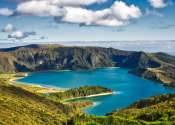Species, threats grow in Mekong region: WWF
Scientists identify a new species every two days in the Greater Mekong region, the WWF said Monday, in a report detailing 2010's more unusual finds such as a leaf warbler and a self-cloning lizard.

Scientists identify a new species every two days in the Greater Mekong region, the WWF said Monday, in a report detailing 2010's more unusual finds such as a leaf warbler and a self-cloning lizard.
Ecology
Dec 12, 2011
0
0
Countries that contain most of the world's species biodiversity are also spending the least on a per-person basis to protect these natural assets, according to scientists from the Wildlife Conservation Society (WCS) and the ...
Ecology
Jun 20, 2016
0
24

Researchers from Sweden, Germany, Brazil and the U.S. have developed a financial mechanism to support the protection of the world's natural heritage. In a recent study, they developed three different design options for an ...
Ecology
Aug 30, 2019
4
13

Changes in precipitation patterns under global climate change affect plant biodiversity in terrestrial ecosystems, with potentially important implications for ecosystem function and processes.
Ecology
May 6, 2022
0
19
A new species of mouse has been discovered in Brazil, the Chico Mendes Institute for Biodiversity Conservation announced Tuesday.
Plants & Animals
Jul 5, 2011
0
0

The world needs a new international protected area target based on scientific evidence, according to a team including University of Queensland scientists.
Ecology
Apr 11, 2019
0
178
Human impact on Earth is becoming indelible and as a result humans, like no other species, have an obligation to take care of the planet and all of those who inhabit it. One case in point is the human effort to save endangered ...
Ecology
Mar 14, 2016
1
92

A continental-scale network of conservation sites is likely to remain effective under future climate change scenarios, despite a predicted shift in key species distributions.
Plants & Animals
Apr 23, 2021
0
30
.jpg)
The scientists (from The University of Western Australia, Kings Park and Botanic Garden, and Kew) argue that deliberately increasing the frequency of fires may lead to ecosystem degradation and loss of biodiversity.
Environment
Feb 18, 2011
0
0

Ivory Coast has announced the creation of its first Marine Protected Area (MPA).
Ecology
Dec 21, 2020
1
23